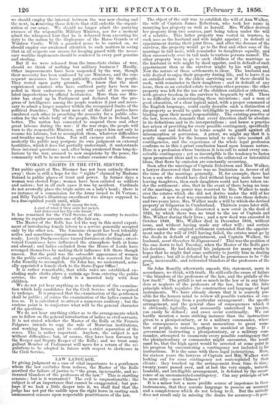WOMAN'S RIGHTS IN THE CIVIL SERVICE.
T IEB public spirit of Mrs. Bloomer has not been entirely thrown away ; there is still a hope for the " rights " claimed by Madame Roland in public places of trust and power. In former days a woman was elected Pope ; women have been enlisted as soldiers and sailors ; but in all such cases it was by accident. Cardinals do not avowedly place the triple mitre on a lady's head; there is no instance of a commission for the Army issued to Di Vernon ; and Billy Taylor's illustrious sweetheart was always supposed to be a fine-spirited youth until, while
"bold she fit among the rest, A gust of wind it blew aside her jacket, And diskivered her lily-rite breast."
It has remained for the Civil Service of this country to receive among its regular servants one of the fair sex.
The Master of the Rolls has led the way in this novel experi- ment of introducing female labour to a service generally accepted only by the other sex. The feminine element has been tolerably active and sometimes conspicuous in the politics of England al- ready-. Lovely Duchesses have turned fortunes at elections ; sweet- voiced Countesses have influenced the atmosphere both at home and abroad ; and ladies excluded from the House of Lords have revenged themselves by making their influence felt there though unseen. But the point was the ostensible appearance of women in the public service, and that acquisition it was reserved for Sir John Romilly to accomplish. Sir John has, we understand, actu- ally appointed a female clerk to the State-Paper Office ! It is rather remarkable, that while rules are established ex- cluding male clerks above a eertain..age from entering the public service, the new lady clerk is a married lady with four children.
We do not yet hear anything as to the nature of the examina- tion which lady candidates for the Civil Service will be required to undergo. It is proposed that the examination of the gentlemen shall be public ; of course the examination of the ladies cannot be less so. It is calculated to attract a numerous auditory ; but the curious point is to conjecture what will be the general character of the questions.
We do not hear anything, either as to the arrangements which are to follow on the general introduction of ladies as civil servants. It is not stated whether the Master of the Rolls or Sir Francis Palgrave intends to copy the rule of Moravian institutions, and working houses, and to enforce a strict separation of the sexes. This is rather important. Anyhow, the subject is not without difficulties ; but, of course they have been foreseen by the Keeper and Deputy Keeper of the Rolls ; and we trust some gallant Member of Parliament will move for a return of the re- olations to be adopted in future with respect to clerkesses in the Civil Service.










































 Previous page
Previous page